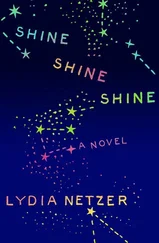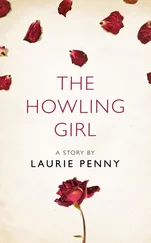“What are you going to do, introduce electric shock whenever the kid hears the word adultery?”
“I don’t know,” said Sally. “I don’t know.”
For the rest of the year, during the mess of the divorces, they comforted themselves with their scheme. While Bernice’s father was mourning, forgetting to pay bills, sinking into silences that lasted a week. While Sally’s mother was engaged in her revenge affair with a neighbor’s husband.
“We could teach her to knit, right?” Sally would say, as they sat huddled in the back of the classroom during social studies, not working on their group project. “And then we could knit him a really special hat or something, pillow, scarf, something. Then we take it away and he loses it. Then when they get together, she happens to find exactly that pattern, and knits it for him again—boom, that’s love.”
“That’s science,” Bernice would correct her.
“That’s love,” Sally would say.
* * *
It was in high school that Sally kissed her first boy and Bernice took her first drink. The boy was a neighborhood friend she had trick-or-treated with as a toddler. The liquor was pilfered from Sally’s mother’s cabinet. It was a Friday night, and the girls were in Sally’s room. Bernice lay under Sally’s bright blue sheets, watching Sally’s Hitachi TV.
“You should come with,” said Sally, who was spreading Nair on her legs.
“That smells terrible,” said Bernice. “It smells like an old lady.”
“Why don’t you come with?” Sally insisted. “We can get Roger to come along for you. Or Chris.”
Sally knew everyone on every sports team, and they were all her buddies. They would no more date Sally, Bernice thought, than they would date their sisters. She was safe from them. But there were other boys, like this neighborhood boy, or boys from other social spheres: the science kids, the poets, the musicians. She still had them to worry about.
“I don’t want to come with,” said Bernice. She sat up and reached over the foot of the bed to change the channel on the TV. “I’m going to stay here with Ponch and Jon.”
“Will you be here when I get back?”
“I already told my dad I’m sleeping over. So it’s either stay here and wait for you to get home or else embark on a life of crime.”
“Are you ever going to double-date with me?” Sally asked. “Promise me you will.”
“I already promised I’d marry my kid off to your kid,” said Bernice. “Doesn’t that count?”
“Maybe,” said Sally. “Will we double-date first? Will we have double husbands?”
“Sure, I see it all now,” said Bernice, pretending to wave her hands over a crystal ball on the bed. She made her voice wobble and wiggle like a witch in a trance. “We’re living together, with our toddlers who are someday to marry.”
“Oh, good,” said Sally, drying her hair on a towel. “And mine is a boy. Come on, I want the boy.”
“Of course, sure, yours is the boy,” said Bernice in her normal voice. Then she resumed the act: “The babies are sitting in their high chairs, eating applesauce that we made from the apples in our own orchard, which we tend with hankerchiefs over our hair. And we’re washing up the pots and the apple grinder.”
“And our double husbands,” Sally reminded her. “Don’t forget that part.”
“Yes, now I see,” said Bernice, covering her eyes with one hand and reaching in front of her with her other arm. “Your husband comes in the room, just as we were laughing about something, and we stop laughing, and we look around at him, and he’s like, ‘What, me? Brave, handsome me?’ and he swings his arms out—”
“His strong, manly arms,” Sally put in. “What does he look like anyway?”
“Like an idiot. He knocks over the crockery on the countertop, and it shatters all over the floor. What a thug. I hate him already.”
Sally laughed. She spread the cream above her knees, up onto her long thighs.
“You don’t even have hair up there,” said Bernice, flopping back down onto the pillow and pulling the sheet and quilt up around her. “You’re just removing hair from nothing.”
“You’re just removing hair from nothing,” Sally pretended to shout at the lotion on her legs. “Oh, my god! Stop removing hair from nothing.”
Bernice sat back up and waved a threatening fist. “I would throw a pillow at you,” said Bernice. “But you would just remove hair from it.”
“Probably,” said Sally, yawning. “Probably I would.”
Bernice leaned up on her knees to turn the sound up on the television, then flopped back on the pillows.
“Hey,” said Sally, “I’m going to write that shit down in my journal, you know? So we can check back. Were you seeing that? Or like seeing that?”
“What do you mean?”
“Like, were you seeing it for real?”
“I don’t see things that way,” Bernice said.
“You do, though,” said Sally. “You do, and you know you do.”
Bernice just shrugged and rolled her eyes. Did she see things? Did she know things? No, it was perception, not prescience. The safety of analytical deduction, not the madness of some second sight. If she could see the future, she would certainly not see Sally married to some arm-swinging oaf.
Sally went out the front door punching her date on the arm, falling off her high-heeled sandals, tugging her cutoffs down over her butt. Her long blond hair was pulled into a ponytail, and her fingertips had been carefully polished by Bernice: petal pink. Bernice shut the door behind her. And then silently crossed to the window to watch them down to the guy’s stupid car. A Gremlin. As it pulled away it made an awful grinding noise before it puttered off. Bernice looked at her watch. Sally’s curfew was 11 P.M., but her mother was out, possibly until morning.
Bernice stood at the window watching the dark street, and then turned to the liquor cabinet and took out the first thing she saw that was clear. She knew enough about high school drinking to understand how to cover her tracks by refilling a bottle with water. Bernice sat down on a black leather ottoman and uncapped the gin. She took a deep swallow. It burned, but not too much. She had imagined liquor would be harder on her throat. Her second thought was to throw up, but she breathed shallowly, and got through it. By the time Sally got home, Bernice was asleep, and nobody ever found out about that. There was no comical scene. There was no hysteria. There was just a mild swimminess, and then lights-out.
The next night, she pressed Sally to try it, but Sally wouldn’t.
“I’m an athlete,” said Sally. “I don’t put poison in the instrument.”
“I’m a chemist,” returned Bernice. “I do.”
* * *
High school was almost over. Bernice was headed to Bowling Green to be a chemistry major, and Sally to the University of Michigan on a basketball scholarship. Through dogged determination and a cheerful willingness to throw fouls, she’d been able to get pretty good at the sport, and at a long, lanky 5′11″, she looked made to play. It was not a full scholarship, but Sally’s father was happy to make up the difference. He could afford it, and he wanted to see his daughter playing NCAA.
Bernice felt at home in the chemistry lab, among scientists who were not prone to ask her how she was feeling, or whether she had good thoughts or bad thoughts, or whether the vomiting was flu or something more sinister. Bernice accepted the separation from her friend. In fact, Sally’s acceptance letter with a scholarship, from the University of Michigan, had been a seed that bloomed into a strong sapling of despair that felt inevitable. Maybe it was rooted in that first night when Sally’s wobbly sandals had carried her down the sidewalk with her first boyfriend on her first real date. It’s when tragedy was born in Bernice’s heart, and never did it leave. In that moment, she saw Sally’s trajectory, and she saw her own, and she saw how they did and didn’t intersect. Everything that mattered to her was clear. And it never got better, all through her whole life.
Читать дальше












